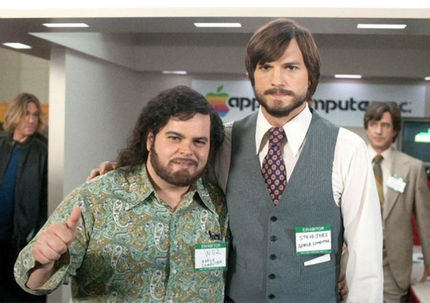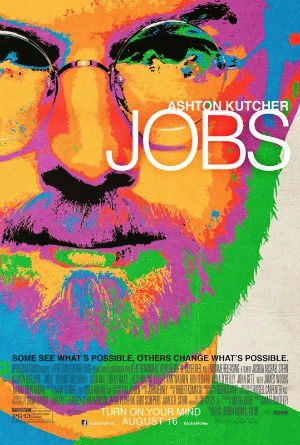Review: JOBS Resembles Genius, But It's Only Skin Deep

From a distance, Ashton Kutcher resembles Steve Jobs -- the slender frame, the distinctive gait, the hunched-over shoulders. Close up, however, Kutcher's lips curl his face into a bemused, smug appearance that he's developed as his trademark, and the memory of the physical resemblance is wiped away as easily as swiping a screen on an iPhone.
Kutcher has cultivated a screen persona as an amiable, non-threatening, clever fellow, which presumably served him well in the long-running TV sitcom That 70s Show, and helped him secure a starring role in the currently-broadcasting Two and a Half Men, but has not done him any favors in films such as Ivan Reitman's No Strings Attached, in which he was unable to give life to his character beyond his obvious physical attributes.
His limitations prove to be a major liability in Jobs, directed by Joshua Michael Stern from a script credited to Matt Whiteley. Trudging through the life of Steve Jobs from his college days to the founding of Apple Inc. and its various corporate ups and downs in the 70s, 80s, and 90s, the film is desperately pedestrian, relying on a series of speechs by Jobs, expounding upon his business philosophy for success, in order to give it structure and, ostensibly, life.
Jobs opens with the introduction of the iPod to a worshipful group of employees in 2001. Their beaming faces convey the idea that Steve Jobs is a god, perhaps the greatest human who has ever walked the Earth! Or, perhaps I'm overstating the case, but clearly it's intended to show Jobs on top of the world as an accepted visionary and business leader. The film quickly whirls back to the 70s, at which time Jobs was a snotty, rebellious dropout still attending classes barefoot and refusing the entreaties of a university official to return to good old Reed College.
Frankly, he's an asshole.
He takes drugs, then goes on a trip to India with his buddy Daniel Kottke (Lukas Haas), and he returns to Northern California. Supposedly, he's now spiritually enlightened, but he's still an asshole, treating women like disposable tissues and happily taking advantage of good-natured, longtime friends like Daniel and Steve Wozniak (Josh Gad). He has big ideas, and he's ambitious, and he doesn't let anything get him down, and he's cut-throat, and he loves to give speeches that are meant to inspire, and he's a pushy, determined salesman, but, mostly, he takes credit for other people's ideas.
And he's an asshole. Let's not forget that.
 The film depicts Jobs as relentlessly terrible with people -- and also a visionary. But it's far better in portraying Jobs as the ultimate non-people person than it is in communicating how, exactly, Jobs was a visionary, and how he inspired his employees to make great products, except to avoid being fired. Late in the story, during a down period in the company's history, he asks one key employee, "Why are you still here?," and the answer is filled with reverential awe and respect for Jobs' past accomplishments and the creative possibilities for the future.
The film depicts Jobs as relentlessly terrible with people -- and also a visionary. But it's far better in portraying Jobs as the ultimate non-people person than it is in communicating how, exactly, Jobs was a visionary, and how he inspired his employees to make great products, except to avoid being fired. Late in the story, during a down period in the company's history, he asks one key employee, "Why are you still here?," and the answer is filled with reverential awe and respect for Jobs' past accomplishments and the creative possibilities for the future.
By that point, however, I was asking myself the same question. Why would anyone continue to work for Apple, under a boss who was so relentlessly demanding and mean and, don't forget, an asshole? Well, there must have been some reason, and probably multiple reasons, but the movie makes working for Jobs look like another menial, demeaning J-O-B.
Matters are certainly not helped by the turgid pace; the puzzling use of extended slow motion to accent otherwise routine scenes in a film that runs 122 minutes; and the insistence on peppering the musical score with pop songs whose sole purpose is to emphasize the time period, which has already been identified with periodic titles. The film is so intent on covering a huge arc of Jobs' corporate career that it reduces his personal life to a footnote, leaving one to wonder how he transformed himself from a huge, unmarried asshole into an asshole with a happy wife and children, including a daughter he had earlier disavowed.
Ah, well. All's fair in love and business, as long as you're remembered fondly as a visionary, right? The large cast includes Dermot Mulroney as a corporate type, Matthew Modine, J.K. Simmons, and Kevin Dunn as other corporate types, and Ron Eldard and Elden Henson as scruffy / brilliant employee types.
Stern directed Swing Vote (2008), which was also dependent in large measure on its star, but in that case Stern had Kevin Costner in full, Middle-American charm mode, and it still fell short. Most likely, he thought Kutcher could pull off a similar rescue job with material that requires a brightly burning star, but despite the color that the other actors bring, the movie is handcuffed to the stiff impersonation that is Ashton Kutcher as Steve Jobs, as well as a premise that presumes brilliant, god-like people just are, man, and we should all be thankful that they deign to walk among us.
Jobs opens in theaters across the U.S. on Friday, July 16.
Jobs
Director(s)
- Joshua Michael Stern
Writer(s)
- Matt Whiteley
Cast
- Ashton Kutcher
- Dermot Mulroney
- Josh Gad
- Lukas Haas







